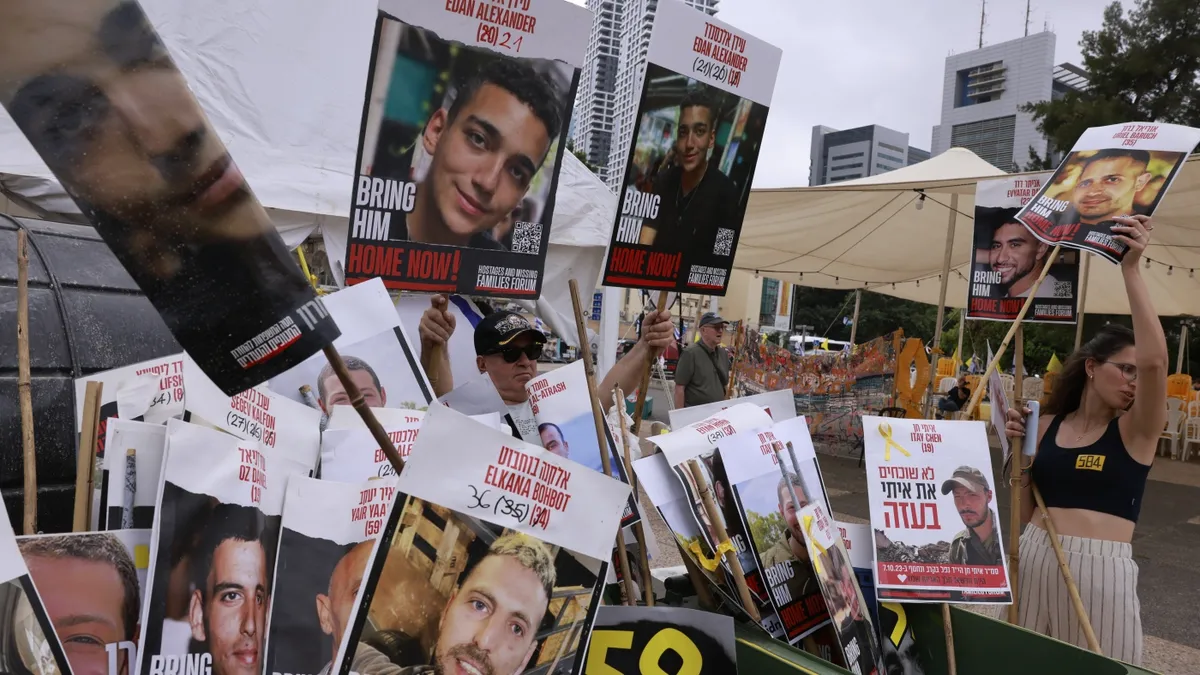
TEL AVIV, Israel — Hamas is anticipated to release Israeli-American hostage Edan Alexander on Monday, signaling a potential step toward achieving a ceasefire agreement with Israel. Alexander, a 21-year-old Israeli soldier who was raised in New Jersey, is currently the only known U.S. citizen captured by Hamas during the October 7, 2023 attack and remains in Gaza, where he is believed to be alive. The bodies of four other American citizens are still reported to be held in Gaza, as stated by U.S. authorities.
Former President Trump highlighted the upcoming release on his social media platform, describing it as a significant move in good faith aimed at ending the ongoing conflict. According to Hamas, extensive discussions have been taking place with U.S. representatives over the past few days, which led to the decision for Alexander's release as part of broader ceasefire efforts aimed at opening Gaza's border crossings and facilitating humanitarian aid.
Israel has imposed a blockade on all aid, including food and medical supplies, for more than ten weeks, intending to pressure Hamas into releasing more hostages. Humanitarian organizations warn that such actions are resulting in severe hunger and distress in the territory. A Hamas official, who wished to remain anonymous due to the sensitive nature of the discussions, indicated that the U.S. has committed to certain gestures in exchange for the release of hostages. This official hinted at the possibility of Israel releasing some Palestinian prisoners and ensuring aid flows into Gaza as part of a larger negotiation led by the U.S. to bring an end to the conflict.
In response, a statement from Israeli Prime Minister Benjamin Netanyahu's office asserted that Alexander's release, without any concessions from Israel, is a result of President Trump's diplomatic efforts and the military's actions in Gaza. The statement emphasized that Israel has not agreed to a ceasefire as a condition for Alexander's release.
In Hostages Square, located in downtown Tel Aviv, numerous Israelis gathered in front of a large screen displaying Alexander's photo, anxiously awaiting news of his release. Supporters held signs bearing images of other Israeli hostages still in Gaza. One attendee, Maya Weinrich, a 27-year-old medical student and dual U.S.-Israeli citizen, expressed her frustrations. “Trump is doing a great job in maintaining and continuing to get these hostages back, and I am not sure what our government is doing to ensure the release of the hostages,” she stated.
In Gaza City, reactions to the potential release of Alexander were mixed. Palestinian resident Awni Abu Kumail suggested that Hamas's decision to release Alexander was a strategic move to demonstrate to the U.S. that they are not obstructing ceasefire negotiations. Another resident, Ahmed Abu Hadid, remarked, “Trump has shown Israel that the United States is stronger. Without the U.S., there would never be any solutions.”
Alexander's anticipated release coincides with Trump's visit to Arab allies in the Gulf, marking his first overseas trip during his second term. Although he is not expected to visit Israel, discussions regarding the future of Gaza are on the agenda with Arab leaders. This U.S.-Hamas agreement represents the latest in a series of significant decisions made by Trump in the Middle East while avoiding direct engagement with Israeli leadership. Previous actions have included negotiations over nuclear talks with Iran and efforts related to a Saudi civilian nuclear program.
Earlier this year, both Hamas and the U.S. confirmed that they had begun direct talks as early as January, marking a notable shift in U.S. policy, which traditionally avoided negotiations with groups designated as terrorists. Key players in the region, including Qatar and Egypt, have welcomed Alexander's release, describing it as an encouraging step toward a ceasefire in Gaza.
Despite the potential release of Alexander, there are still 59 hostages believed to be held by Hamas, with more than half presumed dead, according to Israeli sources. Hamas previously released 38 hostages in exchange for thousands of Palestinian prisoners as part of a ceasefire initiated on January 19, but that ceasefire was broken in March when military negotiations failed.
Israel has since expanded its military operations, controlling approximately a third of Gaza's territory and maintaining a complete blockade on all aid, including food and fuel. The ongoing conflict has resulted in significant casualties, with Gaza health authorities reporting more than 52,000 Palestinian deaths since the war began in October 2023. In Israel, around 1,200 individuals were killed during the October attacks led by Hamas, with approximately 250 people taken hostage.
This complex situation continues to evolve, and the coming days will reveal the implications of Alexander's release on the broader conflict between Israel and Hamas.